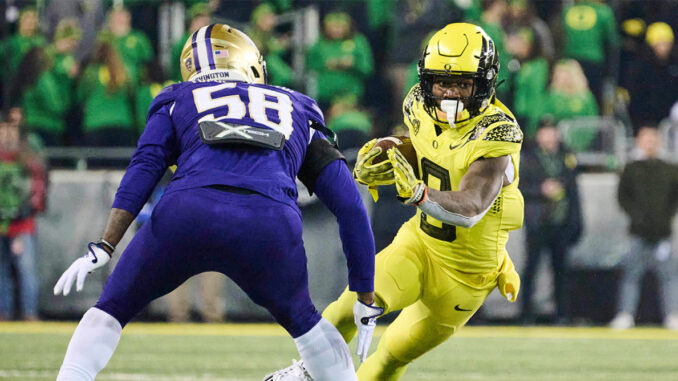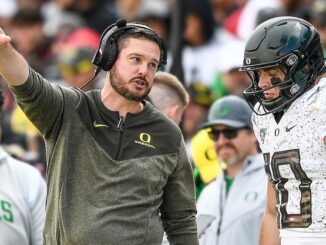
On Friday, the Big Ten voted to add Oregon and Washington to the conference, reducing the Pac-12 to seven schools and delivering the death blow to one of the most storied conferences in college athletics. What will become of the remaining seven schools in the conference? Frankly, no one cares, and frankly, it doesn’t matter in the modern college football landscape, which is the driving force behind this move.
The only thing that matters in the modern major college sports landscape is media rights for football and market size. In landing USC, UCLA, Washington, and Oregon from the Pac-12, the Big Ten has captured not only numerous Top 25 football teams but their media markets as well. The fact that Washington and Oregon were willing to join the Big Ten for 50% stakes in the Conferences media deal speaks volumes about how they perceived the future of the Pac-12 and how non-competitive the Pac-12’s own rights deals negotiations were perceived.
After USC and UCLA announced their intention to bolt to the Big Ten for more money and exposure, the Pac-12 began exploring its own options to get a better rights package. Pac-12 commissioner George Kliavkoff said a new deal was coming soon, and the conference felt it was important to take its time to get the best deal possible. Then a few months later, he said the same thing while he talked a big game about the Pac-12 looking to expand to replace USC and UCLA. Then again, a few months later. Rinse, wash, and repeat until last week when Colorado announced they were leaving the conference to rejoin the Big 12. On its face, losing Colorado was not a big deal. You would be forgiven for forgetting Colorado was even in the conference since you usually had to scroll to the bottom of the standings to find them in any sport. But when the conference’s forgotten stepchild felt it could get a better revenue stream from jumping to a different conference, what would the remaining big guns in the Pac-12 think?
At that point, what had been a waiting game turned into “Nellie bar the door.” Suddenly Kliavkoff announced a streaming deal that he swears he certainly had not just pulled together out of desperation and was highly competitive. It was a subscription-based package with Apple TV, otherwise known as America’s somethingteenth favorite streaming service, which you may remember as the icon you moved off your Roku home screen so your kids could find Netflix.
Surprising absolutely no one other than Pac-12 leadership, it wasn’t enough for the likes of Oregon and Washington, who were probably on the phone to the Big Ten as soon as Kliavkoff finished saying “Apple TV.”
Now the Pac-12 is down to seven teams without any major media markets. Utah, Arizona, and Arizona State figure to try and bolt to the Big 12 as soon as humanely possible. Oregon State and Washington State, left without their bigger rivals, maybe try and find a home as big fish in a small pond in the Mountain West or the WAC, ironically two of the conferences the Pac-12 had their eye on potential targets to poach schools from. Cal and Stanford, as the two “academically” minded schools in the conference, maybe try to pull a BYU and put most of their sports in a conference like the WCC. At the same time, football plays independently or finds a separate conference home. The only sure thing is that the Pac-12 is doomed as a singular functioning entity.
While Oregon and Washington figure to get a media rights windfall by joining the Big Ten, it’s hard to see the move being successful from an actual athletic or academic performance standpoint. Travel time and costs are about to increase substantially. Rivalry games that once determined conference or division titles now have significantly less pizazz. It might help them make a greater case for inclusion in the College Football Playoff. But that’s about it. What about the rest of the sports? Or the success of student-athletes who will now be spending even less time in the classroom and more time in planes (for the lucky ones in revenue sports) or vans (for the less lucky ones). To get an idea of how much academics play a role in a move like this, it’s best to keep in mind that the Big 10 has stuck with the Big 10 moniker for several years now because they can’t count any higher than that to tally up their number of member schools.
The Pac-12 could have easily prevented all of this by a) Having an actual competitive rights package to keep USC and UCLA in the fold or b) Quickly moving to an alternative of expansion or a new rights deal to rebuild the conference or at the very least keep at its traditional number of ten teams. The conference managed to do neither. Instead, their pace over the months since USC and UCLA left more resembled a tech startup waiting to be bought out by a bigger competitor so the owners could take their golden parachutes.
Just as those startups tend not to care about what happens to their employees after they get bought out, neither do the schools jumping conferences seem to care about the downsides for their student-athletes. On the one hand, their coaches will complain about players jumping teams in the transfer portal to finish their careers or to get a better NIL deal. On the other hand, nothing stops those coaches from jumping ship or for their school to decide that instead of playing most of their games on the west coast, they’ll now get to travel to the exotic locales of Michigan and New Jersey for conference games.
I don’t blame Oregon and Washington, or even USC, UCLA, or even Colorado, for leaving. The blame falls at the feet of the Pac-12 and the realities of the modern college sports landscape. They are doing what they feel is best for their institution, even if it comes to the detriment of the athletes on the field.




